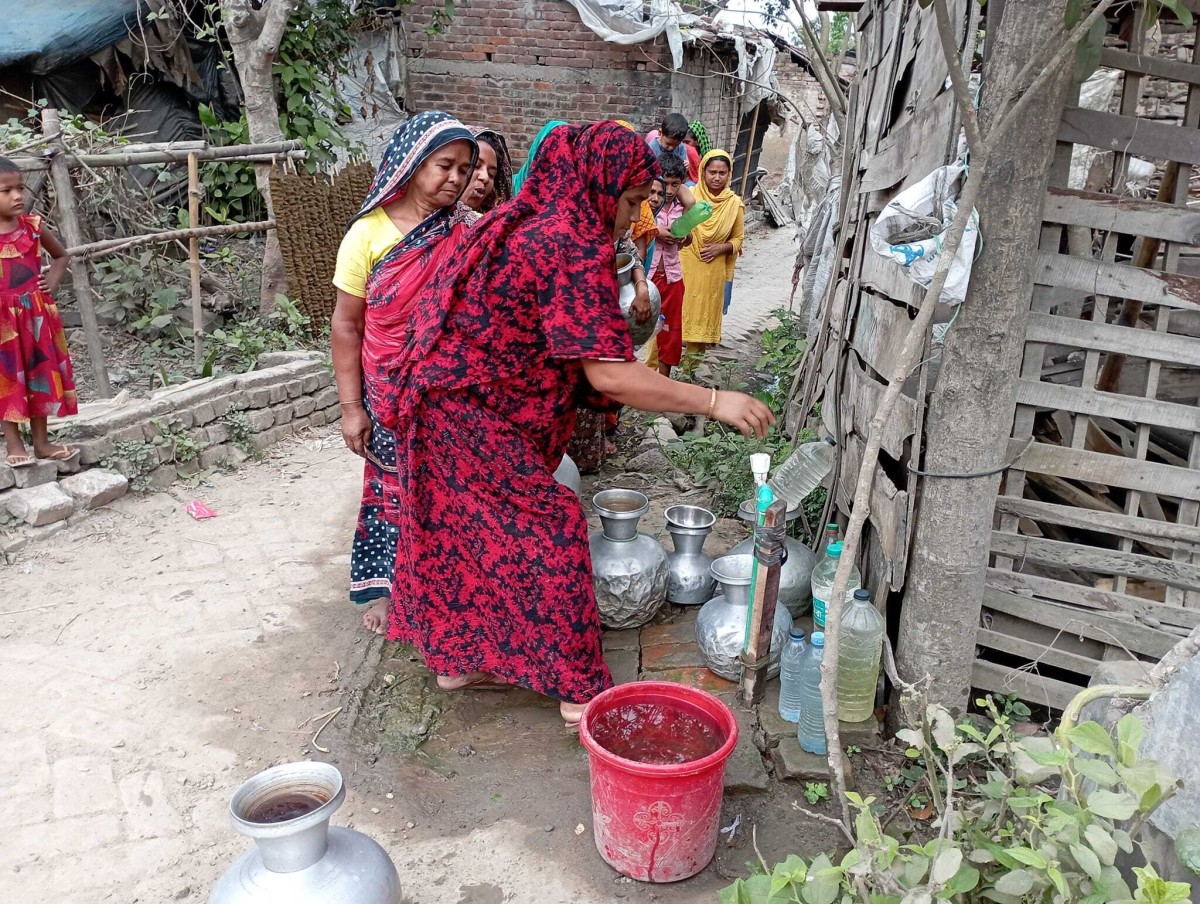Dealing with the water crisis in Bangladesh, the story of Mahmuda
Dealing with the water crisis is dealing with climate change in Bangladesh. Women and girls are disproportionately affected. Read Mahmuda Begum's story.
Written By Ashish Kumar Das (Officer MEL), Practical Action, Bangladesh and Samir Kumar Paul, MEL and Communication Assistant, Simavi
Water management is primarily the responsibility of women in Bangladeshi households. Mahmuda Begum used to spend two to three hours per day gathering water.
The 27-year-old Mahmuda Begum lives in Kolony para, Koloroa Municipality, Satkhira. There are about 50-60 families who live in this colony and most of the people live in poverty and can’t afford to buy filtered water. Mahmuda is one of them. She and her family faced acute drinking water and household water shortages three years ago. This is a result of the extremely salty water.

Effect of climate change on groundwater salinity and contamination
River flow, tidal surges, rainfall, groundwater extraction, sea-level rise, and other climatic variables influence the salinity of surface and groundwater in Bangladesh.
The overly salty water is the result of two interrelated processes. First, the water level lowers because to intense groundwater extraction . Second, when sea levels rise, water flows from the top to the bottom in accordance with its natural law. As a result, groundwater becomes salinized.
The rate of sea level rise in Bangladesh over the past 22 years is larger than the global average over the last 100 years. By 2050, roughly 17 percent of Bangladesh will be submerged by rising sea levels, displacing 20 million people . Rising sea levels are a significant factor to the salinity of groundwater in Bangladesh's coastal districts.
Due to the saline and contaminated water, Mahmuda began to consume and use pond water for residential uses. Because of that, her children were more prone to infectious diseases, such as cholera, dysentery, diarrhea, and typhoid.
Dealing with the water crisis is dealing with climate change in Bangladesh
Women and girls are disproportionately affected by the water crisis
As water management is primarily the responsibility of women in Bangladeshi households, Mahmuda used to walk for an hour and a half to collect pond water. She had to cross a highway for this with fast driving vehicles. Besides that, during the rainy season the roads remain waterlogged which created a barrier for walking. The holes, sewerage connection and lakes submerge under water and become prone to accidents. Mahmuda once faced an accident too and her family had to spend a good amount of money for treatment.
Since she had no choice other than to spend two to three hours per day gathering water, she could not spend time in agricultural and livestock activities during that time. This affected her monthly income.
The role of the WASH SDG WAI sub-programme in tackling water salinity challenge involving stakeholders
Since there were many women like Mahmuda who had to spend precious time collecting water and were facing dangerous situations in doing so, the situation needed to change. As a part of the WASH SDG WAI sub-programme the issue was raised and followed up in several meetings like Multi Stakeholders Coordination Committee (MSCC), Water and Sanitation (WATSAN) committee and alike.
The process involved many stakeholders on community and on municipal level, which finally led to the municipal authority of Kolaroa installing a running pipe water supply stand post in Mahmuda’s settlement. Since then, Mahmuda can collect drinking water near her residence.
This effort has helped Mahmuda, her family and the broader community to achieve good health and well-being. Also, the time that she spent on fetching water can now be used to look after the livestock and agriculture.
Despite this, there are still many women like Mahmuda who are affected by the water crisis and the sufferings that comes with it. That's why through the Water Wake-Up Call Simavi and it’s partners want to raise awareness that the climate crisis is a water crisis and we want to encourage governments to take urgent action.
About WASH SDG subprogramme
The WASH SDG Programme is implemented by the WASH SDG Consortium that consists of SNV, WASH Alliance International, and Plan International is supported by the Dutch Ministry of Foreign Affairs. To accomplish sustainable change, the program interacts with local partners)
(The WAI WASH SDG Programme (WASH SDG Programme – WASH Alliance International (wash-alliance.org)) is a six-year effort that aims to enhance access to and utilization of safe drinking water, sanitation, and hygiene in seven African and Asian countries. Specific focus is given to gender and social inclusion, climate risk, and resilience within the program.

